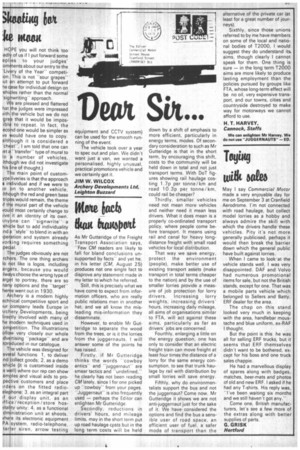As Mr Gutteridge of the Freight Transport Association says, - Few
Page 69

If you've noticed an error in this article please click here to report it so we can fix it.
CM readers are likely to fall for bland conclusions unsupported by factsand yet he, in his letter (CM, August 25) produces not one single fact to disprove any statement made in my letter to which he referred.
Still, this is precisely what we have come to expect from information officers, who are really public relations men in another hat, and we all know the misleading mis-information they disseminate.
However, to enable Mr Gutteridge to separate the wood from the trees, or is it the lorries from the juggernauts. I will answer some of the points he has raised.
Firstly, if Mr Gutteridge thinks the words "cowboy anticsand -juggernautare smear tactics and "undefined," he clearly has not been reading CM lately, since I for one picked up -cowboyfrom your pages. -Juggernaut" is also frequently used — perhaps the Editor can enlighten Mr Gutteridge
Secondly, reductions in drivers' hours, and mileage limits, may in the short term put up road haulage costs but in the long term costs will be held down by a shift of emphasis to more efficient, particularly in energy terms, modes. Of secondary consideration to such as Mr Gutteridge is that in the short term, by encouraging this shift, costs to the community will be held down in total and not just transport terms. With DoT figures showing rail haulage cos ting 1.7p per tome/km and road 10 3p per tonne/ km, could rail be cheaper?
Thirdly, smaller vehicles need not mean more vehicles and neither need it mean less drivers. What it does mean is a properly co-ordinated transport policy, where people come before transport. It means using rail and canal for heavy longdistance freight with small road vehicles for local distribution.
That way we save energy, protect the environment (people), make better use of existing transport assets (make transport in total terms cheaper to the nation) and by the use of smaller lorries provide a measure of job protection for lorry drivers. Increasing lorry weights, increasing drivers' hours, increasing daily mileage, all .aims of organisations similar to ETA, will act against these aims, particularly as far as drivers' jobs are concerned.
Fourthly, enlarging a little on the energy question, one has only to consider that an electric freight train can move freight at least four times the distance of a lorry for the same energy consumption, to see that trunk haulage by rail with distribution by small lorries will save energy.
Fifthly, why do environmentalists support the bus and not the juggernaut? Come now, Mr Gutteridge it shows we are not anti-juggernaut just for the sake of it. We have considered the options and find the bus a sensible user of road space, an efficient user of fuel, a safer mode of transport than the alternative of the private car (at least for a great number of journeys).
Sixthly, since those unions referred to by me have members on some of the local and national bodies of T2000, I would suggest they do understand its aims, though clearly I cannot speak for them. One thing is sure — in the long term T2000 aims are more likely to produce lasting employment than the policies pursued by groups like FTA, whose long-term effect will be no oil, very expensive transport, and our towns, cities and countryside destroyed to make way for motorways we cannot afford to use.
H. T. HARVEY, Cannock, Staffs
We can enlighten Mr Harvey. We do not use "JUGGERNAUTS" — ED.
























































































































